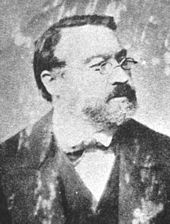
Back Ernst Trumpp German अर्नेस्ट ट्रम्प Hindi エルンスト・トランプ Japanese ਅਰਨੈਸਟ ਟਰੰਪ Punjabi ارنیسٹ ٹرمپ PNB ارنيسٽ ٽرمپ Sindhi ارنسٹ ٹرمپ Urdu

Ernest Trumpp (13 March 1828 – 5 April 1885) was a Christian missionary sponsored by the Ecclesiastical Mission Society. He was also German professor of Oriental Languages at the University of Munich and a philologist.[1] With an intent to convert the populace of western un-divided India to Christianity, he was seconded and sent to the Sindh and Punjab region (British India). He first came to India in the 1850s and published scholarly work on the Sindhi and other western subcontinental languages. He also worked to translate the Sikh scriptures to help Christian missionaries to understand Sikhs and thereby aid their conversion.[2][3][4]
He authored the first Sindhi grammar entitled Sindhi Alphabet and Grammar. He also published Grammar of Pashto, or language of the Afghans, compared with the Iranian and North Indian idioms.[5]
One of his controversial works was based on an 8-year study of the Sikh scriptures, where he attempted to philologically analyze and translate a significant portion of the Guru Granth Sahib into English in the 1870s.[1][3][6] Trumpp was limited in his knowledge of sub-continent languages to a few that he had studied, while the Granth Sahib was composed using multiple languages of the South Asia region. Hence, numerous discrepancies appear in his partial translations, which were rejected by the mainstream Sikhs. Many observers of the faith (Sikhs, Hindus and Muslims) regarded his introductory remarks to his translation as "extremely offensive".[7] According to the Indologist Mark Juergensmeyer, criticism of Trumpp's translation was also, in part, due to discussions only with Nirmala Sikhs and not with mainstream Sikh scholars. However, setting aside Ernest Trumpp's nasty remarks, he was a German linguistic and his years of scholarship, translations, as well as field notes and discussions have been used by contemporary scholars with caution.[8]
- ^ a b Trilochan Singh (1994). Ernest Trumpp and W.H. McLeod as scholars of Sikh history religion and culture. International Centre of Sikh Studies. pp. xv–xvii, 45–49.
- ^ McLeod, W. H. (2009). The A to Z of Sikhism. Scarecrow Press. pp. 206–207. ISBN 978-0810868281.
- ^ a b "German Contributions to the Study of Indian regional languages and Sanskrit – Sindhi". india.diplo.de. Archived from the original on 9 August 2012. Retrieved 2 August 2012.
Ernst Trumpp (1828–1885) came to India in 1854, learnt Sindhi and many other languages of the Western regions of the subcontinent.
- ^ J.S. Grewal (1993). John Stratton Hawley and Gurinder Singh Mann (ed.). Studying the Sikhs: Issues for North America. State University of New York Press. pp. 164–165. ISBN 978-0-7914-1426-2.
- ^ Clements, Frank (2003). Conflict in Afghanistan : a historical encyclopedia. Santa Barbara, Calif.: ABC-CLIO. p. 358. ISBN 978-1-85109-402-8.
- ^ The Adi Granth, Ernest Trumpp (1877), WH Allen & Co., London; Notes: In this 876 pages publication, Trumpp's translation starts at page 156, while philological notes on the language of the Sikh scripture start at page 140
- ^ W.H. McLeod (1993). John Stratton Hawley and Gurinder Singh Mann (ed.). Studying the Sikhs: Issues for North America. State University of New York Press. pp. 67 note 25. ISBN 978-0-7914-1426-2.
- ^ Mark Juergensmeyer (1993). John Stratton Hawley and Gurinder Singh Mann (ed.). Studying the Sikhs: Issues for North America. State University of New York Press. pp. 16–17. ISBN 978-0-7914-1426-2.